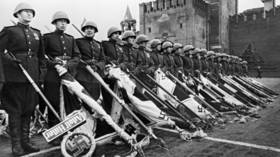The South African authorities have argued that Inkosi Albert Luthuli was killed by apartheid-era officials in 1967
South African National Prosecuting Authority (NPA) advocates have been given four months to give Judge Nompumelelo Radebe a convincing argument that Inkosi Albert Luthuli was killed by apartheid operatives, not a goods train as was officially found soon after he died in 1967.
Advocates Ncedile Dunywa, Annah Chuene, Siyabonga Ngcobo, and Xolani Msimango concluded, leading several people with evidence on June 11.
Since the beginning of the inquest at the Pietermaritzburg High Court on April 14, the advocates have led an array of witnesses with evidence.
Those who testified included South African Police (SAPS) members, Directorate for Priority Crime Investigation (DPCI) officials, scene reconstruction and simulation experts, forensic analysts, medical evidence, family members of Chief Luthuli, anti-apartheid activists, and friends of Luthuli.
Former justice minister Jeff Radebe also testified.
The matter was postponed from June 11 to October 13, where the advocates would be given until October 16 to give closing arguments.
The same court also postponed on June 17 the inquest on the death of another struggle stalwart, Griffiths Mxenge, who was killed by stabbing in Umlazi on November 19, 1981, to October 9.
The Mxenge matter was first postponed on 14 April to give those who felt they might be implicated in his death, who were apartheid police officers at the time, a chance to apply for the government to provide them with legal representatives, as they were employed by the state when Mxenge was killed.
The court first postponed Mxenge’s matter to June 17, which was the holding date to establish if the officers had succeeded in finding lawyers.
On their return on June 17, the court heard that their applications to have the state-provided lawyers were still pending.
Since the beginning of Luthuli’s inquiry, scores of Luthuli’s family members, ANC leaders and supporters have been frequenting the court to hear what caused the death of the president-general of Africa’s biggest liberation movement and the Nobel Peace Prize winner.
Luthuli died at the age of 69 at the Stanger Hospital on July 21, 1967, hours after he was found with multiple head and upper-body injuries at the railway line Mvoti River bridge.
The inquest heard that even his death at the hospital was questionable because he was not afforded proper medical attention that could have saved his life.
The NPA instituted an inquiry as there were beliefs that the initial inquest conducted in September 1969 misled the public about the cause of his death.
Magistrate C.I. Boswell, who presided over the inquest at the Stanger Magistrate’s Court, had concluded that Luthuli had been hit by the goods steam train that was traveling to Durban as he was crossing the bridge to his sugarcane farm.
The report indicated that Luthuli might not have heard the train hooting or seen it coming, despite that it was approaching him from the front. Another theory was that Luthuli deliberately ignored the train to kill himself.
However, experts who testified before Judge Radebe indicated that Luthuli was likely attacked.
The experts were backed by the National Archives Advisory Council chairperson, Sibongile Mnyandu-Nzimande, who testified that her family member witnessed white men assaulting Luthuli with a shovel near the bridge where the train was stationed.
Mnyandu-Nzimande told the judge that her relative, who was a messenger transporting documents between Luthuli and her grandfather, was few days later taken away by police to state what he witnessed, but was never found again.
At the beginning of the inquest, Dunywa said the outcome of the inquest, held the same year Luthuli died, was not based on fact and evidence, “but rather on the suppression of justice aimed at ensuring that the perpetrators remained hidden and protected”.
He said Boswell wrote correspondence on August 4, 1967, preempting the outcome even before the evidence was presented before him.
Dunywa stated that Boswell communicated his written opinion to the Secretary of Justice that “I had to report that an inquest in connection with the death of Albert John Luthuli will be held at Stanger by me on 19 September 1967 at 10 am.
“From the report available at present, I do not expect the finding to be anything other than accidental. The cause of death furnished by the district sergeant might be questioned by the relatives, but I can not anticipate on what grounds the dispute is raised.”
First published by IOL

 3 hours ago
1
3 hours ago
1











